The iPhone 5 Review
by Anand Lal Shimpi, Brian Klug & Vivek Gowri on October 16, 2012 11:33 AM EST- Posted in
- Smartphones
- Apple
- Mobile
- iPhone 5
General Purpose Performance
Section by Anand Shimpi
Apple's philosophy on increasing iPhone performance is sort of a mix between what Microsoft is doing with Windows Phone 7/8 and what the high-end Android smartphone makers have been doing. On the software side Apple does as much as possible to ensure its devices feel fast, although I notice a clear tendency for newer iOS releases to pretty much require the latest iPhone hardware in order to maintain that speedy feel over the long haul. When it comes to hardware, Apple behaves very much like a high-end Android smartphone vendor by putting the absolute fastest silicon on the market in each generation of iPhone. The main difference here is that Apple controls both the software stack and silicon, so it's able to deliver a fairly well bundled package each year. It's a costly operation to run, one that is enabled by Apple's very high profit margins. Ironically enough, if Apple's competitors would significantly undercut Apple (it doesn't cost $599 - $799 to build a modern smartphone) I don't know that the formula would be able to work for Apple in the long run (Apple needs high margins to pay for OS, software and silicon development, all of which are internalized by Apple and none of which burden most of its competitors).
Good cross platform benchmarks still don't really exist on smartphones these days. We're left describing experience with words and trying to quantify performance differences using web based benchmarks, neither of which is ideal but both of which will have to do for now. The iPhone 5 experience compared to the 4S is best explained as just being snappier. Apps launch faster, scrolling around iOS Maps is smoother, web pages take less time to load and the occasional CPU/ISP bound task (e.g. HDR image processing) is significantly quicker. If you're the type of person who appreciates improvements in response time, the iPhone 5 delivers.
How does it compare to the current crop of high-end Android smartphones? I would say that the 5 generally brings CPU performance up to par with the latest and greatest in the Android camp, and in some cases surprasses them slightly. It's difficult making cross platform comparisons because of huge differences in the OSes as well as separating out tasks that are CPU bound from those that simply benefit from a higher rendered frame rate.
I took a cross section of various web based benchmarks and looked at their performance to help quantify where the iPhone 5 stands in the world. First up are the RIABench focus tests, these are javascript benchmarks that focus on various compute bound tasks. I used Chrome for all Android devices to put their best foot forward.
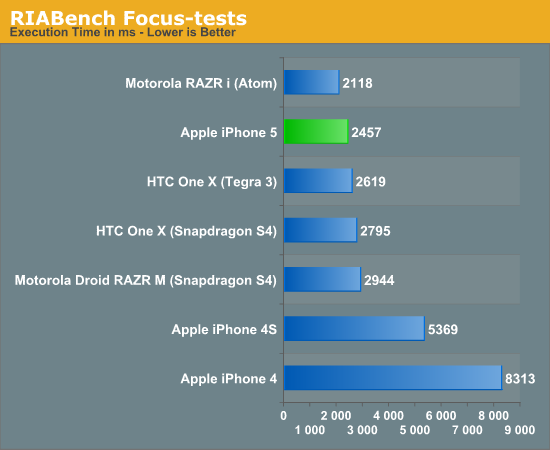
This first test shows just how slow the 800MHz Cortex A9s in the iPhone 4S were compared to the latest and greatest from Qualcomm and NVIDIA. At roughly half the clock speed of those competitors, the 4S was just much slower at compute bound tasks. Apple was able to mask as much of that as possible with smooth UI rendering performance, but there was obviously room for improvement. The iPhone 5 delivers just that. It modernizes the iPhone's performance and inches ahead of the Tegra 3/Snapdragon S4 platforms. Only Intel's Atom Z2460 in the Motorola RAZR i is able to outperform it.
Next up is Kraken, a seriously heavy javascript benchmark built by Mozilla. Kraken focuses on forward looking applications that are potentially too slow to run in modern browsers today. The result is much longer run times than anything we've seen thus far, and a very CPU heavy benchmark:
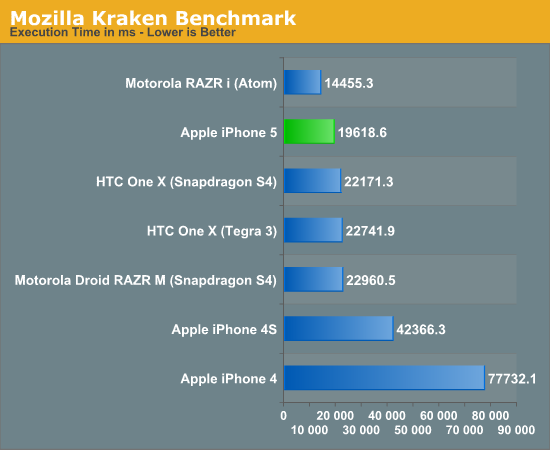
The standings don't change much here. The iPhone 4S is left in the dust by the iPhone 5, which steps ahead of the latest NVIDIA/Qualcomm based Android devices. The Apple advantage here is just over 10%. Once again, Intel's Atom Z2460 pulls ahead with the clear lead.
In our iPhone 5 Performance Preview we looked at Google's V8 javascript test as an alternative to SunSpider. The more data points the merrier:
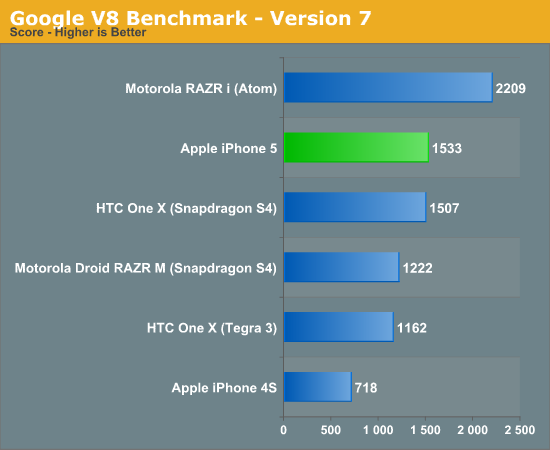
Here the iPhone 5 manages to hold onto its second place position, but just barely. Once more, the Atom based RAZR i maintains the performance lead.
Google's Octane benchmark includes all 8 of the V8 tests but adds 5 new ones including a PDF reader, 3D bullet physics engine and portable 3D game console emulator all built in javascript.
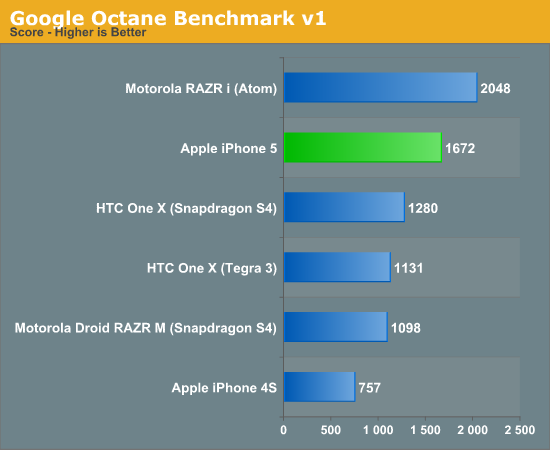
The 5 pulls ahead of the HTC One X here and maintains a healthy 31% lead, but once again falls short of the RAZR i.
We of course included our SunSpider and BrowserMark tests, both of which show the iPhone 5 very favorably:
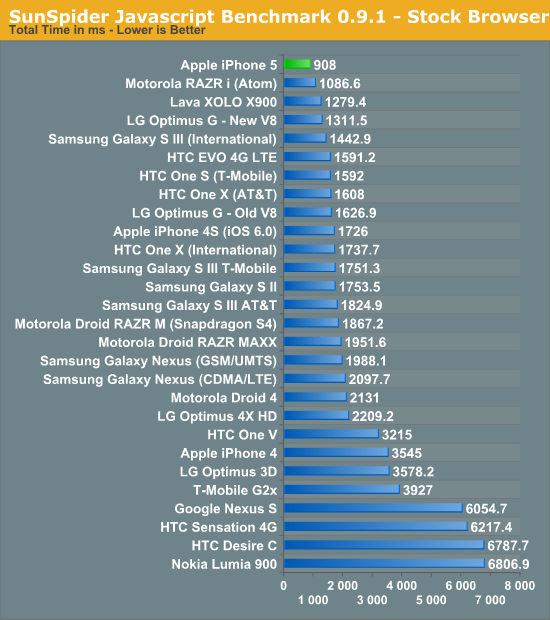
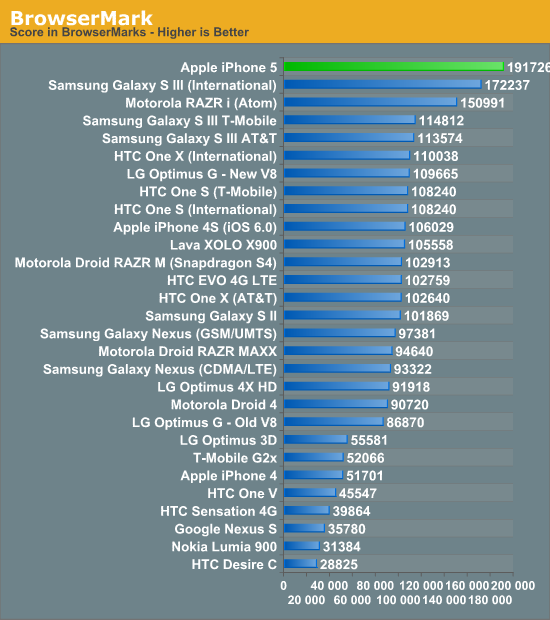
Performance obviously depends on workload, but it's clear the iPhone 5 is a big step forward from the 4S and tends to outperform the latest ARM based Android smartphones. As the rest of the ARM based SoC players move to Cortex A15 designs they should be able to deliver faster devices in the first half of 2013.
Intel's current position when it comes to CPU performance is interesting. A move to a dual-core design could be enough to remain performance competitive with 2013 ARM based SoCs. Remembering that Atom is a 5 year old CPU core that performs at the level of a 10 year old mainstream notebook CPU puts all of this progress in perspective. Intel's biggest issue going forward (other than getting Atom into more tier 1 phone designs) is going to be improving GPU performance. Luckily it seems as if it has the roadmap to do just that with the Atom Z2580.










276 Comments
View All Comments
grkhetan - Wednesday, October 17, 2012 - link
You dont "need iTunes" per se to use the iPhone any more. However, it is required if you sync music. However, I use iTunes Match -- so I dont need to use iTunes sync for anything... However I need to use iTunes to upload my music to the iTunes Match servers but thats it. I am happy to say with iCloud and iTunes Match -- "syncing" my iPhone is something that is no longer required at all.Touche - Wednesday, October 17, 2012 - link
One doesn't need iTunes, except one does...however, you don't, however you need it...but happily, you don't require it at all, except you do.Hmm...
grkhetan - Wednesday, October 17, 2012 - link
Touche, iTunes is not required to use the phone if you dont need music/videos using the default player. (You could play them from streaming services like Spotify/Pandora, etc or store it in dropbox).But if you need to play music using the default music player -- you need to use iTunes to sync the music over. BUT if you use iTunes Match, then you dont need to use "iTunes sync", but you need iTunes to upload the music to iTunes Match servers. This itself is not painful at all in my opinion -- the main burden with iTunes was the "sync"
phillyry - Sunday, October 21, 2012 - link
I'm sorry but I'm going to have to agree with Touché here.Please don't backtrack/double back to justify the fact that you do in fact need iTunes on an iPhone and need to sync it. Wired or wireless it's still a sync - it just goes through iCloud when done wirelessly.
Lets not confound the matters of whether the use of an iPhone is pleasant or not with whether you need to use the generally unpleasant iTunes sync. Apple's lockdown on sync methods sucks for the users freedom of access to their own device but, despite that, the device is still great to use.
ThreeDee912 - Wednesday, October 17, 2012 - link
Basically, if you want to put your own media on your iPhone, you'll need iTunes to sync or upload with iTunes Match.You can do everything else on the phone itself.
darkcrayon - Wednesday, October 17, 2012 - link
No, you don't need iTunes to put media on your iPhone. You do need it to put media in the stock Music or Videos app. If you don't want to use those there are many apps that let you supply your own music via wifi copy to the iPhone or by downloading them directly from the web if you have such a source.I don't have any issue with iTunes though so I just use that.
steven75 - Wednesday, October 17, 2012 - link
Funny, I know people who have switched the other way and are hugely relieved to be free of the bloatware, nervous anticipation of "will my phone ever get updated?", and crappy plastic hardware.In summary, anecdotes are fun and enjoy what ya got.
KPOM - Thursday, October 18, 2012 - link
Don't let the door hit you on the way out. Also, don't complain when Samsung decides your phone is "too old" for the latest update. I resisted the iPhone as long as I could. I even had a Nexus One for over 18 months. But once Google decided that its former flagship, which was released 6 months after the iPhone 3GS, was 'too old" to get any OS after Gingerbread (which it got about 3 months after Gingerbread devices came out) I decided I could no longer put up with Google's tactics. Plus, it's nice no longer giving away all my personal information to Google just for the privilege of using their bloated copycat OS.Spunjji - Friday, October 19, 2012 - link
No. Now you're giving it to Apple for the privelege of using their bloated copycat OS instead.Seriously, I was following you write up until your final crock-of-shit statement. All smartphone operating systems use your data, and they all borrow from each other.
Leyawiin - Wednesday, October 17, 2012 - link
"POOF!"Hate the commercials, but that guy makes me laugh.